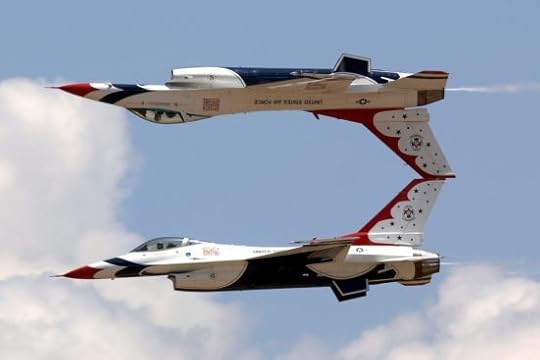Air Force Flight Operations Are Not Always Serious
Though I fly through the valley of death, I shall fear no evil. For I am at 80,000 feet and climbing!
—Entrance sign to an old SR-71 operating base

There’s a time for seriousness and a time for fun. Like all good organizations, working in an enjoyable environment can make people more dedicated to their job. The United States Air Force is no exception. Sure, discipline is expected because it is a military organization after all, but discipline does not need to dampen the mood for fun. It only makes it more refined.
Let’s take their communications as an example. In movies, you know how pilots—when transmitting via radio—often talk in a calm and confident way? That manner of speaking is real in the Air Force, and for no good reason other than to sound cool. This vocal tradition started with Chuck Yaeger—a WWII American fighter pilot who is the first to have exceeded the speed of sound and broken the sonic barrier. The pilots that came after Yaeger emulated his articulation, and the skill has been passed down through generations of aviators.
Air traffic controllers also have their own speaking style, but unlike the pilots, they got it from NASA’s flight control center in Houston, and they have it for a purpose—to convey confidence and control over any situation. It is the controller’s job to give advice to pilots, who most likely will panic if their engines are on fire. After all, a controller can’t say, “Oh my god! The engines are on fire!” That’s the pilot’s line.
Air Force Fun
Speaking of pilot-controller interaction, Brian Shul, a Vietnam veteran and retired major in the US Air Force, witnessed a legendary mic-drop moment during his time as an SR-71 Blackbird pilot. (The SR-71 holds the world record for the fastest-manned aircraft.) Brian included this story in his book, Sled Driver. Since the book is no longer in print, here is a shortened version of what happened:
Brian and his copilot, Walter Watson, were flying their SR-71 back to base after having completed their final training sortie. As they had nothing better to do, they began monitoring their radio. They were above Los Angeles Center’s airspace so most of the radio chatter came from there. They listened as a Cessna pilot asked Center for a readout of his ground speed. Center, using the calm voice of controllers, replied, “November Charlie 175, I’m showing you at ninety knots on the ground.”
After the Cessna’s inquiry, a Twin Beech piped up on frequency, in a rather superior tone, asking for his ground speed. “I have you at one hundred and twenty-five knots of ground speed,” came Center’s reply.
Out of the blue, a Navy F-18 pilot chimed in on the radio. “Center, Dusty 52 ground speed check.” This got Brian wondering why Dusty 52 asked Center for a readout when F-18s have ground speed indicators in their cockpits, then he realized that Dusty wanted every puke to know that he’s the fastest bird in the air that day. “Dusty 52, Center, we have you at six hundred twenty on the ground.”
It was this time that Brian heard Walter turn his mic on. Very professionally and without any emotion, Walter spoke, “Los Angeles Center, Aspen 20, can you give us a ground speed check?” And the reply came as if it was an everyday request, “Aspen 20, I show you at one thousand eight hundred and forty-two knots across the ground.”
In that brief moment, Walter became a god, the Air Force overruled the Navy, and all aircraft bowed down to the superiority of the SR-71.
“Ah, Center, much thanks, we’re showing closer to nineteen hundred on the money,” Walter said in the same Yaeger voice he used earlier. Both SR-71 pilots heard a rare crack in the controller’s voice when Center replied, “Roger that Aspen, your equipment is probably more accurate than ours. You boys have a good one.”
The post Air Force Flight Operations Are Not Always Serious appeared first on Gene Fish.



